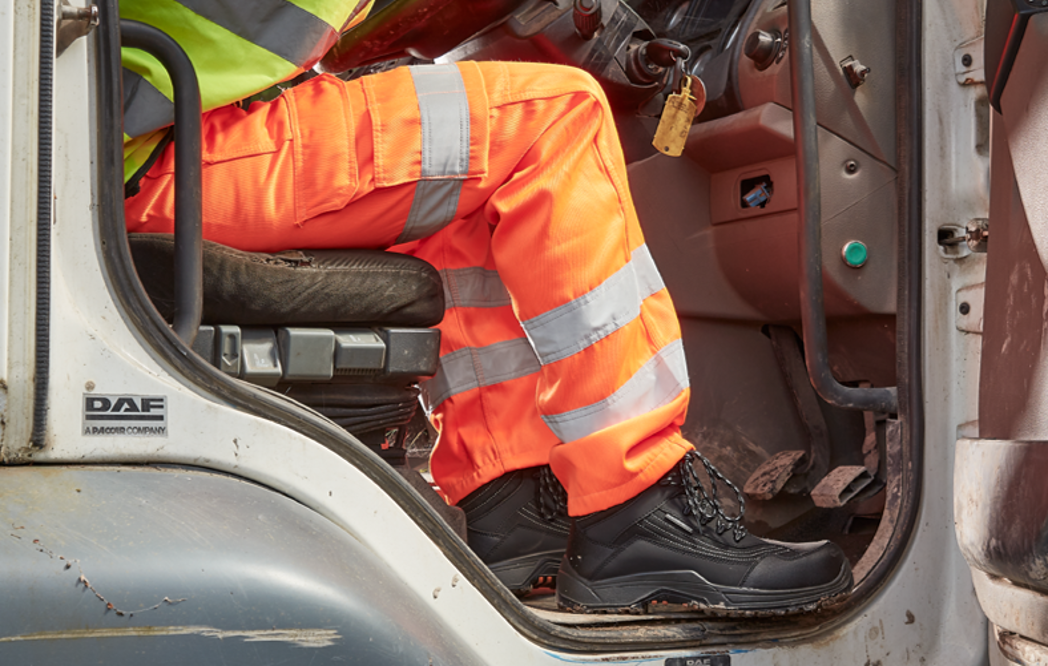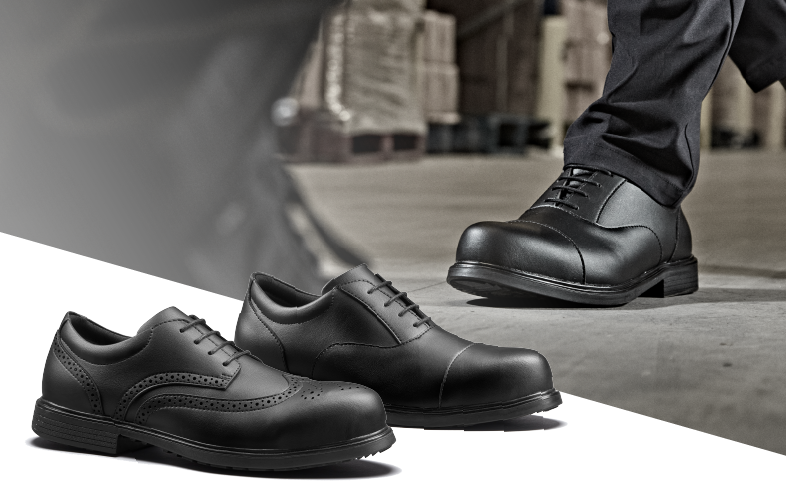Toecaps, midsoles, padded lining, cushioned insoles. A safety boot can have a lot going on under the leather, but there might be even more than you think – and they could be doing you some big comfort favours.
Did you know that almost all safety boots are made with built-in energy-absorption?
WHAT IS SAFETY FOOTWEAR ENERGY-ABSORPTION?
 Energy-absorption is one of those safety boot features which often goes unnoticed. You can't see it, and because it's an almost universal safety boot requirement, it’s often not marketed in the way protective boot features are. But, it plays a very important role.
Energy-absorption is one of those safety boot features which often goes unnoticed. You can't see it, and because it's an almost universal safety boot requirement, it’s often not marketed in the way protective boot features are. But, it plays a very important role.
Energy-absorption is when the seat (the heel) is made of material which prevent injuries from impact loading - the force put on our limbs from standing, walking or lifting. This means it’s a shock-absorbing feature.
THE IMPACT AND FORCE OF WALKING
The forces that your feet and legs have to absorb are greater than you think. Your lower limbs are already carrying your weight and working hard to keep you balanced, but when you walk, they've got to then produce a change of momentum as you land, and then create the energy to turn the downward motion to an upward motion to begin the following step!
This force can be up to 1.5 times your body weight. Now imagine you're carrying heavy blocks or weighty equipment, all the while taking thousands of steps. And this is why energy-absorption in boots is so important, as it minimises this almost constant impact by:
- Taking the impact and dissipating it around the footwear and away from the lower limbs
- Reducing fatigue when walking or standing on hard surfaces
- Reducing injury if a worker falls from height and lands on their feet
- Aiding comfort by adding additional cushioning
And for many work boot wearers, one, some or all of these could apply.
Without energy-absorption, wearers can experience foot fatigue, which can involve painful issues such as blood pooling and cramping.
How does a safety boot get energy-absorption?
A manufacturer can develop a safety boot with energy-absorption in a number of ways. They can use a sole compound with a degree of cushioning, or they can add a layer of material between the sole and the upper (a midlayer) to contain the necessary shock-absorbance.
Some boots are made with increased durability with a higher density of polymer, which contains less shock-absorption as a result. So, this decreased ‘sponginess’ is often compensated with a cushioned insole. As long as the boot absorbs 20 Joules of energy with one, some or all of these components, it can be labelled as ‘Energy-Absorbing’ as per the safety standard.
How do I know if my boots have energy-absorption?
In the new EN ISO 20345:2022 standards:
Boots come in 8 different safety categories (SB-S7) depending on their safety features.
For example, if a boot has a midsole, it's classed as S3, but if it's also waterproof, it falls into the S7 category. The good news is that other than SB classified boots (Safety Basic boots, which feature a toecap only) energy-absorption appears in all other ‘S’ categories.
In the old EN ISO 20345:2011 standards:
Boots come in 6 different safety categories (SB-S5), and energy-absorption codes work in the same way as the 2022 standards. In all classes other than SB, energy-absorption will be present.
So, chances are this comfort feature is inside your work boot already!
Energy-absorption is shown with the letter ‘E,’ but often this won’t be written on the boot’s safety spec, as the classification SB-S7 (2022) or SB-S5 (2011) will indicate this feature is present.
The energy-absorption feature is easy to spot on V12 products though. We make it clear that a boot has this benefit in its safety spec with the following icon:
![]()
If you want to learn more about the safety standards, find what you need to know in this blog.
Next level comfort - spotlight on shock
While energy-absorption is a key benefit to work boot wearers, at V12 we really like to step up for comfort. That's why we've invested so much time creating a footwear solution to make our wearers feel the difference.
Dynamic ArchTM insoleS

An effective insole will ease pressure and enhance comfort by counteracting the lack of shock-absorption from hard surfaces.
Collaborating with motion analysts and podiatrists, V12’s Dynamic ArchTM insoles were designed with open-cell rebound material to support arches and absorb impact for longer. They feature:
- Supportive foam to ease pressure
- Bespoke arches to decrease foot pain
- Breathable foam to reduce aching feet
- Shock-absorbing heels to minimise stress
Find out more here.
Cushioned mid-layer
V12 Footwear are passionate about foot health and safety, so we build in comfort wherever possible. That’s why our boots are made with a premium EVA midlayer to give the wearer further energy-absorption and keep comfort in, and painful limbs out.
Find out more about what goes into a V12 boot to give it next-level comfort in this blog.
Can you have too much cushioning?
Yes. It can be a bad idea to go over the top on cushioning. Watch below to find out why.
IF YOU'RE AN EMPLOYER
It’s your duty to ensure staff are protected from workplace health hazards, so you have a responsibility to make sure the appropriate shock-absorbing or anti-fatigue PPE is available to maximise your team's safety. So, make sure you know:
- what energy-absorbing properties your team’s safety boots have
- where they sit within the EN ISO 20345 safety footwear classifications
- if additional shock-absorbing or anti-fatigue solutions are needed
If you're a safety distributor
If you provide safety footwear, it’s important to stay updated on the EN ISO standards, particularly as they have recently changed, as this will be vital in guiding your customers to keep their team safe and comfortable.
So, now you know more about energy-absorption is present within most safety footwear, it might be time to start selecting the other safety and comfort features you need to keep you, your team or your customers safe.
NEXT STOP: THE RIGHT BOOT
To find the right safety footwear, we've made it super simple with our V12 Boot Finder. Based on our expert industry knowledge, this easy-to-use tool provides you with your 'best pick' safety boot: all you need to do is click the safety and comfort requirements you have such as environment, hazards and surfaces, and we’ll give you a boot that has everything you need to stay protected, pain-free, and productive.





